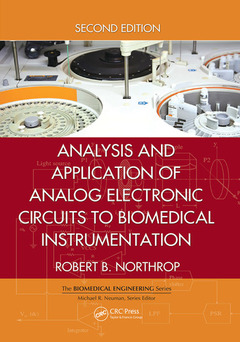Analysis and Application of Analog Electronic Circuits to Biomedical Instrumentation (2nd Ed.) Biomedical Engineering Series
Auteur : Northrop Robert B.

Analysis and Application of Analog Electronic Circuits to Biomedical Instrumentation, Second Edition helps biomedical engineers understand the basic analog electronic circuits used for signal conditioning in biomedical instruments. It explains the function and design of signal conditioning systems using analog ICs?the circuits that enable ECG, EEG, EMG, ERG, tomographic images, biochemical spectrograms, and other crucial medical applications.
This book demonstrates how op amps are the keystone of modern analog signal conditioning system design and illustrates how they can be used to build instrumentation amplifiers, active filters, and many other biomedical instrumentation systems and subsystems. It introduces the mathematical tools used to describe noise and its propagation through linear systems, and it looks at how signal-to-noise ratios can be improved by signal averaging and linear filtering.
Features
- Analyzes the properties of photonic sensors and emitters and the circuits that power them
- Details the design of instrumentation amplifiers and medical isolation amplifiers
- Considers the modulation and demodulation of biomedical signals
- Examines analog power amplifiers, including power op amps and class D (switched) PAs
- Describes wireless patient monitoring, including Wi-Fi and Bluetooth communication protocols
- Explores RFID, GPS, and ultrasonic tags and the design of fractal antennas
- Addresses special analog electronic circuits and systems such as phase-sensitive rectifiers, phase detectors, and IC thermometers
By explaining the "building blocks" of biomedical systems, the author illustrates the importance of signal conditioning systems in the devices that gather and monitor patients? critical medical information. Fully revised and updated, this second edition includes new chapters, a glossary, and end-of-chapter problems.
What?s New in This Edition
- Updated and revised material throughout the book
- A chapter on the applications, circuits, and characteristics of power amplifiers
- A chapter on wireless patient monitoring using UHF telemetry
- A chapter on RFID tags, GPS tags, and ultrasonic tags
- A glossary to help you decode the acronyms and terms used in biomedical electronics, physiology, and biochemistry
- New end-of-chapter problems and examples
Sources and Properties of Biomedical Signals. Properties and Models of Semiconductor Devices Used in Analog Electronic Systems. The Differential Amplifier. General Properties of Electronic, Single-Loop Feedback Systems. Feedback, Frequency Response, and Amplifier Stability. Operational Amplifiers and Comparators. Introduction to Analog Active Filters. Instrumentation and Medical Isolation Amplifiers. Noise and the Design of Low-Noise Signal Conditioning Systems for Biomedical Applications. Digital Interfaces. Modulation and Demodulation of Biomedical Signals. Power Amplifiers and Their Applications in Biomedicine. Wireless Patient Monitoring. RFID Tags, GPS Tags, and Ultrasonic Tags Used in Ecological Research. Examples of Special Analog Circuits and Systems Used in Biomedical Instrumentation. Appendix. Glossary. Bibliography and Recommended Reading.
Robert B. Northrop is Professor Emeritus and the former Program Director of the Biomedical Engineering Graduate Program at the University of Connecticut.
Date de parution : 04-2017
17.8x25.4 cm
Disponible chez l'éditeur (délai d'approvisionnement : 14 jours).
Prix indicatif 71,13 €
Ajouter au panierDate de parution : 03-2012
Ouvrage de 588 p.
17.8x25.4 cm
Disponible chez l'éditeur (délai d'approvisionnement : 15 jours).
Prix indicatif 178,41 €
Ajouter au panierThèmes d’Analysis and Application of Analog Electronic Circuits... :
Mots-clés :
MOS Switch; Equivalent Circuit; analog electronic circuits; ECAP; biomedical instrumentation; Dc Gain; RFID; UHF RFID Tag; GPS; Time Constant Form; biomedical engineering; bioengineering; Frequency Response Function; electronic circuits in biomedical instrumentation; Poa; biomedical electronic circuits; NVF; bioinstrumentation; Bode Plot; special analog electronic circuits; Amp; signal conditioning systems; PLL; instrumentation amplifiers; THD; medical isolation amplifiers; DAC Output; op amps; RFID Tag; power op amps; Gps Tag; wireless patient monitoring; Npn BJT; UHF telemetry; Pn Junction Diode; ultrasonic tags; Glass Micropipette Electrodes; fractal antenna design; MS Output; Successive Approximation ADC; PSR; Active RFID Tag; Output SNR



